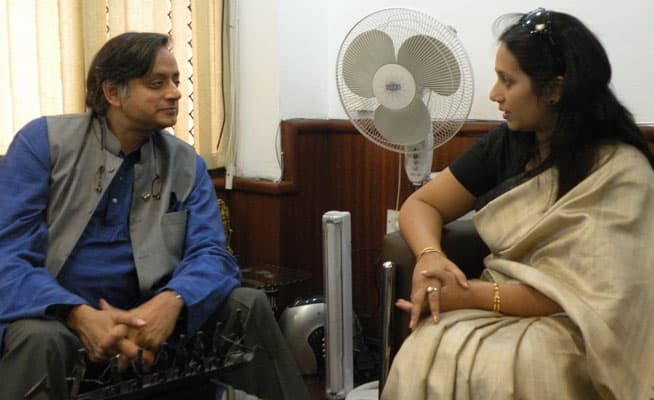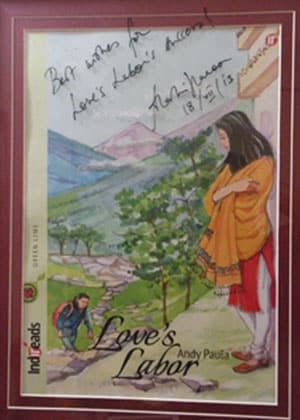The decision to approach Minister of State, HRD, Dr. Shashi Tharoor, to inaugurate my debut novella Love’s Labor, had two bases. One, he is a prolific author with over a dozen books to his credit; two, he understands the digital medium like no one else of his standing does. The second was relevant because Love’s Labor is an e-book, and electronic books are the future of publishing, say the intelligentsia. Also, Tharoor, as one of the winners of the first Indian Digital Media Awards (2010) would appreciate the concept of a digital book like few others would.

Keeping a tight rein over a palpitating heart and fluttering eyelashes, when I met the stalwart, the occasion turned out rewarding in other unexpected ways too. The suave persona that I had hitherto admired on the screen became a reality as the event proceeded. The book was launched and autographed and photographs graciously granted, but what was exemplary was Tharoor’s effortless public dealing with people he was meeting for the first time. For the Trainer in me, such a live demonstration of Soft Skills was a takeaway I will cherish for life.
Soft Skills are behavioral competencies that relate to an individual’s emotional intelligence quotient (EQ). Proficiencies like friendliness, optimism, communication that enhance a person’s interactions & performance are some commonly desirable Soft Skills. While hard skill or core competency can help us get hired, it is Soft Skills that further our career prospects. My simple analogy to define Soft Skills is this: Between two shops that sell the same products at the same price, I’ll go to the one where the shop-keeper is better behaved.
My own training in Soft Skills happened with the Minister of Human Resources, without him even realizing it! What better way than to lead by example?
1. Respect for Time
This fundamental mark of professionalism that ought to be a default is treated with such callous disregard in our culture that it is imperative to earmark it as the most sought-after ‘trait’. Respect for another’s time includes being punctual for meetings; adhering to TAT or turn around time in all domains of work – replying to emails and other correspondence within two business days, closure of a task within the stipulated time etc; seeking an appointment instead of barging into the manager’s cabin and observing rules that ensure better time management for all.
I had sent a mail to Dr. Tharoor at 22:08, June 26, requesting an audience with him to unveil my book; at 12:41, June 27, less than one business day, he sent a personal reply agreeing to the meeting. He had marked the mail to his office so there was no miscommunication and they calendared the meeting at the earliest available slot. The promptness of the response was as heartening as the affirmation that it brought. What immediately struck me was the respect he had accorded to an unknown author and how the agenda was clearly communicated to all concerned to avoid any confusion. I had been given a 3.30pm slot and I was ushered into his chamber exactly at the scheduled time on the day of the meeting. If an active public figure can respect people’s time, how busy are the rest of us that we cannot?
2. Image & Grooming
The importance of ‘looking the part’ can never be emphasized enough. Whether it is a business meeting, a wedding or a condolence, dressing appropriately lends the required dignity to the participant while conveying to the world that one is mindful of the occasion and respects it enough to reflect that in the dress code.
A torn-jeans at a social-do is as much an oddity as a floral shirt on a corporate honcho on a weekday. How often have we heard the lament that someone didn’t ‘look’ like a doctor or a lawyer? While such labels stem from an overall inexperience that the person’s demeanor may have revealed, his clothing and physical hygiene play an equally crucial role in these observations. An H.R. Manager I worked with once rejected a candidate outright seeing his sloppy dressing, completely ignoring the commendable language skills that otherwise made him a perfect fit for the role.
In his solid-colored kurtas teemed with Jawahar jackets, Tharoor is every bit the erudite Minister with respect for his chair, who one can look up to and aspire to emulate. The groomed hair, clean nails, and comfortable footwear add to his charisma as does the subtle deodorant that does not overwhelm.
3. Rapport & Empathy

In his profile, Tharoor meets at least twenty new people each day, and often, more. Yet how does he manage to leave his mark on all those he meets? I’ll leave you with the scenario and let you decide for yourself.
3.30pm, July 2013. A fresh-looking, smiling Tharoor gets up from his high-backed chair and walks towards the door to receive a debut author and her family. He shakes hands with all, pats the gents’ back like they are friends and offers the sofa instead of the wooden table behind which he was seated. He greets me in my native tongue that simultaneously impresses me and puts me at ease. He asks me if I like the way the book has turned out, listens to my reply and acknowledges it. He reads a page from my book and appreciates my craft. And before focussing all the attention on me, his external customer for the day, he built rapport with the gents showing interest in their careers, indulging in banter about their dollar-salaries and making eye-contact with all while talking to one. Can such an experience leave anyone untouched?
4. Listening Skills
In the haste to speak, we often forget to listen. Or we engage in ‘selective listening’ – retaining parts of the conversation that is beneficial to us. Consequently, we miss out on important information that could have added weight to our performance. Active Listening, as a customer service mandate, is phasing out as Reflective Listening takes a position of prominence. A communication strategy that involves two key steps, Reflective Listening seeks to first understand the speaker’s idea and then conveys it back to the speaker post reflection to ensure that the idea has been understood as intended.
Tharoor’s undivided attention to the conversation, responding appropriately to statements and asking the relevant questions proved more effective than a listener merely paraphrasing thoughts to gauge comprehension.
5. Effective Communication
While the essential ingredients of communication are vocabulary, ease with the language and the ability to express oneself, what makes it effective is how the above are conveyed. Tharoor is not known as one of the most articulate communicators for nothing. The politeness in his tone far outweighs the polished accent, a quality so contagious that the other party picks the cue without realizing it! Polite words keep the atmosphere congenial and make the conversation meaningful. This is not to say that a confrontation is not useful in grave circumstances, but the world is not a war-field, and more often than not, decency dissolves what aggression aggravates.
Non-verbal cues in communication form lend authenticity to the words being used. A discerning listener can tell the difference if the speaker’s body language authenticates his thoughts or is grossly aberrant from them. The congruence between words and mood is apparent in the tone of voice, posture, attention to the meeting at hand, etc.
In my meeting with Tharoor, no cell-phone rang, no pager beeped. For a man who, as his OSD claims, is a ‘one-man show’ in his social networking, the urge to Twitter could have been immense. For the constantly-connected generation, it may even seem like a necessity. But the Doctor was fully focussed on the meeting, listening intently to what I had to share, asking relevant questions, pausing for the response and even mirroring my body language (as a photograph would later reveal).
6. Know Your Customer
Every training session on Soft Skills highlights the importance of knowing one’s customer. The RBI directive of KYC has the banks scuttling to know the people behind the account numbers; it has been realized that humans are the most important resources, much more than what was accredited to them earlier in a capitalist economy. Half the problems of the world will be solved if people embrace this philosophy.
The burning desire to be known as one of the deepest cravings of the human heart. Ironically, while we want others to know us, we seldom display that same interest in getting to know them. In this lopsided equation, a person who ‘does unto others as he wishes others to do unto him’ is easily spotted. Such a person addresses others by name, compliments their clothes, remembers their significant days and listens without judging.
You may also love to read: Dr. Tharoor, What Were You Thinking?
Tharoor did all that and more. When we met him, he knew that my husband had gifted me one of his books and welcomed him as ‘the man with the good taste’, he knew I am a Bengali and greeted me with a nomoshkar instead of the impersonal hello, he remembered the name Love’s Labor and that my debut novel was an e-book, he also remarked on my pseudonym Andy Paula and made it amply clear that he was not meeting strangers. Nothing had quite prepared us for such warmth, hospitality, and recognition.
I came away thinking my next book will be on him, and not a fiction 😀
So we are armed with all these Soft Skills and some more. What then sets us apart from the others? A signature style helps. Something that is uniquely our own – a trait, a talent, a greeting or, actually, a signature. Look at the picture and see how Dr. Tharoor has written the date below his name, the month in Roman. Now that’s some cool style, what say!

